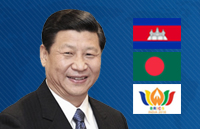ROK voices regret over DPRK's vow to bolster nuke
(Xinhua) Updated: 2013-01-23 16:32SEOUL - The Republic of Korea (ROK) expressed "deep regret" Wednesday over the Democratic People's Republic of Korea (DPRK)'s vow to strengthen its nuclear deterrence in defiance of the expanded UN sanctions.
Hours after the UN Security Council condemned the DPRK's December 12 satellite launch, the DPRK's foreign ministry vowed to "take physical actions to strengthen self-defense military capabilities including nuclear deterrence" and declared an end to denuclearization talks.
"The six-party talks and the joint September 19 statement were rendered null and the denuclearization of the Korean Peninsula was put to an end," the ministry added, referring to the stalled disarmament-for-aid talks and the 2005 declaration that commits the DPRK to disarmament on the Korean peninsula.
The defiant statement dismisses a new resolution adopted earlier in the day by the 15-nation UN body, which called for the DPRK to "immediately comply fully with its obligations" under previous resolutions banning it from conducting missile and nuclear tests and other provocations.
The DPRK has defended its right to launch a satellite for peaceful and scientific purposes, while its critics, including the United States and South Korea, saw the launch as a disguised ballistic missile test.
"We express our deep regret (over the statement)," Park Soo-jin, a spokeswoman for Seoul's unification ministry, told reporters during a press briefing. "We urge North Korea (DPRK) to stop making threats of additional provocations and make denuclearization efforts through concrete action."
ROK's foreign ministry issued a statement welcoming the adoption of the resolution 2087, which condemned the use of ballistic missile technology by Pyongyang in violation of previous resolutions.
"We should note that the Security Council expressed its determination to take significant action in the event of a further DPRK launch or nuclear test," the ministry said in a statement.
"The ROK's government will keep a close eye on the future development and maintain close consultations with other countries concerned," ministry spokesman Cho Tae-young told reporters.
Meanwhile, the US envoy on the DPRK arrived in ROK for consultations on follow- up actions to expanded UN sanctions on Pyongyang.
Glyn Davies, who is accompanied by Clifford Hart, the chief US envoy for six-party nuclear talks, will meet with ROK's top nuclear envoy Lim Sung-nam Thursday to discuss future DPRK policy.
The envoy is also scheduled to meet with the transition team of ROK's president-elect Park Geun-hye, according to the US state department, before traveling to Beijing and Tokyo.
Park, who has repeatedly pledged to mend icy ties with the northern neighbor, has yet to speak publicly on the new UN resolution and the subsequent reaction from Pyongyang.
- DPRK vows to end denuclearization talks
- China says new UN resolution on DPRK balanced
- DPRK vows to strengthen nuclear deterrence
- US CEO gets rare DPRK honor
- UN Security Council slams DPRK satellite launch
- DPRK device had homegrown technology
- DPRK's Kim visits Taesongsan General Hospital
- DPRK allows foreigners to bring cell phones







